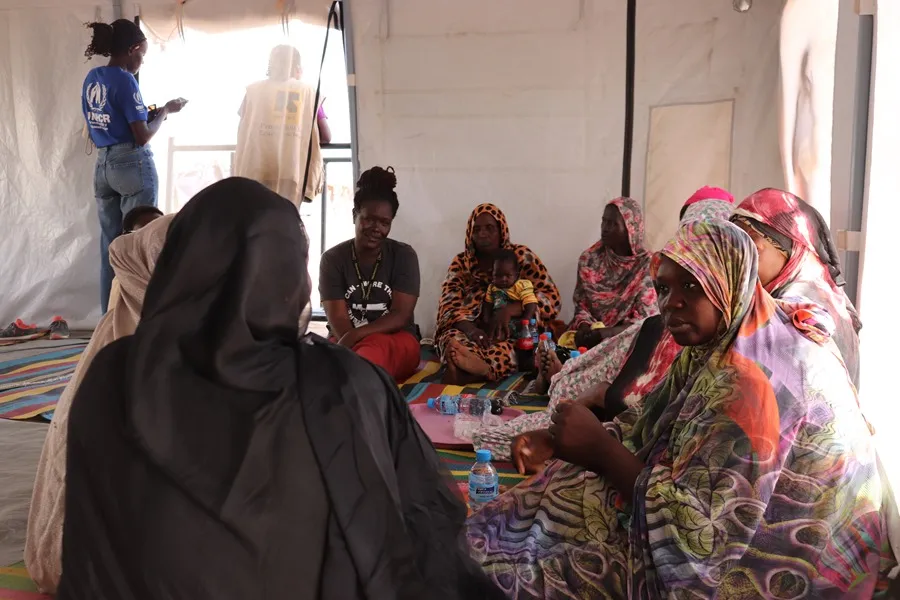International
Refugees from the Sudan war rebuild their lives between fear and hope

Every afternoon, a group of women fleeing the conflict in Sudan gather in a tent in the transit center of Renk, a border town in the territory of South Sudan, to participate in a workshop on gender violence, where they share their testimony, receive the attention of professionals and begin to heal the wounds that the war left them in body and mind.
Some of the attendees are South Sudanese returnees; others, Sudanese refugees, and all try to overcome the fear, suffering and violence, in many sexual cases, that they lived during their escape from the war that broke out more than a year ago between the Army of Sudan and the paramilitary group Rapid Support Forces (FAR).
They sit in a circle and listen in silence to one of the women who decides to explain her story. Some nod, a tear runs down the cheek of another who plays with the hem of her colorful dress, while a woman decides to add her experience.
The safety and well-being of their children was the first thing, despite being paralyzed by fear. Salma, a fictitious name, tells EFE that his three children were unable to sleep due to the fear of bombs and gunfire. Now they sleep a little better, but they are still restless.
“We fled our home in Khartoum (capital of Sudan) around midnight. No car. We walked in silence to another town and another and another,” Salma says about the nightmare of leaving his house behind and crossing the Joda border crossing to apply for refuge in South Sudan.
He doesn’t talk about her. She doesn’t feel prepared. She explains that she lost her husband along the way, without giving details, and is grateful because the little ones can go to a kind of nursery in the center, but regrets that the elderly cannot continue studying.
Dunia, also a pseudonym, feels lucky to have her husband, but shares her concern for minors. “I want my children to be able to go back to school. We want them to open a school here, we don’t want to go to the Mabán refugee camp,” he explains.
After spending half a month in the Renk transit center, the refugees are transferred to the Mabán camp, a nearby location, but neither Dunia nor other women want to: “The facilities are not good and they rape girls and women when they move away to the latrines or to look for firewood in the outskirts,” he says.
Sexual violence against women is a common weapon in all wars. It’s not easy to talk about this episode in their lives. None of them do it. Shame and social and community rejection weighs, and they do not want to reopen wounds that are still healing.
According to a report issued in February by the Office of the United Nations High Commissioner for Human Rights, “at least 118 people were exposed to sexual violence, including rape, gang rape and attempted rape,” while Sudanese human rights organizations raise the figure to more than 370 in just over a year of war in the African country.
However, these figures are only the tip of the iceberg. The director of the government Department for the Fight against Violence against Women and Children, Salima Ishaq, told EFE that only 2% of the victims of sexual violence have dared to report it to the authorities, while the rest avoid it because of “social restrictions” or “for fear of reprisals.”
“The estimates indicate that the complaints we receive do not exceed 2% of the actual incidents of sexual violence, which means that the total number could reach 7,000 cases of sexual violence,” he added.
Sexual violence has another retaliation: unwanted pregnancies. The Sudanese authorities announced in mid-May that they had taken in a dozen babies abandoned by women raped by FAR fighters, although they did not disclose possible cases resulting from alleged rapes committed by members of the Army.
Yamila was robbed of everything during her escape. Some armed men took her husband and demanded a ransom. He doesn’t have money or know where he is, not even if he’s still alive. “I want him to come back. I’ve thought about killing myself because my children ask me about him and I don’t know what to answer, but I have to move on for them,” he says in tears.
“They are the future. I want you to study and go to university. They are sad because they don’t go to class. One wants to be a teacher, the other wants to be a doctor,” he adds. Despite everything, he appreciates the company of the other women because they give him strength.
It agrees with her Nouran, who recognizes the positive effect that this therapy group has among the participants: “We talk about our problems and look for solutions. Together we are stronger and we help and advise each other, we talk about the children…”
The session ends, but they all feel a little lighter and more lively. They think that when they say something out loud, they take a weight off their back. Tomorrow they will return and little by little they will reinforce this network of women with which they are rebuilding their lives with a shared desire: that the war ends to return to their home, Sudan.
International
Federal Judge Blocks Trump Policy Allowing Deportations to Third Countries

A federal judge ruled on Wednesday that the policy of U.S. President Donald Trump’s administration allowing immigration authorities to deport foreign nationals to third countries without prior notice or the opportunity to object is unlawful. The decision marks another legal setback for the administration on immigration matters.
Judge Brian Murphy of the U.S. District Court for the District of Massachusetts struck down the regulation issued last year, which stated that Immigration and Customs Enforcement (ICE) was not required to notify migrants if they were to be sent to countries other than the one listed in their removal order, provided that receiving nations offered assurances they would not face persecution or torture.
Murphy ordered the measure vacated but granted a 15-day delay before the ruling takes effect, giving the Trump administration time to file an appeal.
In his decision, the judge concluded that the policy violates federal immigration law and migrants’ due process rights. He also questioned the lack of transparency surrounding the alleged assurances provided by receiving countries, stating that “no one really knows anything about these supposed ‘assurances.’” He added, “It is not right, and it is not lawful.”
The ruling follows several legal disputes involving deportations to third countries. Last year, the executive branch deported more than 200 Salvadorans to a maximum-security prison in El Salvador, invoking an old wartime law. The White House also held talks with Costa Rica, Panama, and Rwanda about receiving migrants who are not citizens of those countries.
In May, the same judge determined that the government violated a court order when it attempted to remove a group of immigrants with criminal records to South Sudan without prior notice or an opportunity to raise claims of fear of persecution.
Although President Donald Trump took the case to the U.S. Supreme Court, which temporarily allowed the deportations to resume while a final decision was pending, the White House is expected to again appeal to higher courts to overturn this latest judicial ruling.
International
Cocaine Production Surges 34% in 2023 as Market Expands into Africa and Asia

The global cocaine market is the fastest-growing among all illicit drugs worldwide, the International Narcotics Control Board (INCB) warned on Thursday in its annual report presented in Vienna.
The body attributes this expansion to the sustained rise in production in South America — particularly in Colombia — as well as increasing demand in emerging regions such as Africa and Asia.
According to the report, global cocaine production surpassed 3,700 metric tons in 2023, marking a 34% increase compared to 2022. This growth is largely driven by the expansion of illicit coca cultivation in Colombia and the greater production capacity of clandestine laboratories.
The INCB noted that the market has not only grown in volume but has also diversified and become more globalized. While Europe and North America remain the primary destinations, trafficking routes now reach “all regions of the world,” including Africa — traditionally considered a transit zone — and Asia, where the presence of cocaine was previously marginal.
In Western and Central Europe, for the fifth consecutive year, seizures in 2023 exceeded those in North America, consolidating the region as the leading destination market. Between January 2019 and June 2024, more than 1,826 metric tons of drugs bound for European ports were seized, of which 82% was cocaine, equivalent to 1,487 metric tons.
The report also highlights that seizures in Africa rose by 48% in 2023 compared to 2022, reflecting the expansion of the market on the continent. Globally, the number of cocaine users increased from 17 million in 2013 to 25 million in 2023.
International
Clinton Accuses Republican Committee of Using Epstein Case to Shield Trump

Former U.S. Secretary of State and former First Lady Hillary Clinton denied on Thursday before a congressional committee that she had ever met convicted sex offender Jeffrey Epstein in person or had any knowledge of the crimes he committed.
Clinton testified behind closed doors from New York before the House Oversight Committee. The wife of former President Bill Clinton — who is scheduled to testify on Friday — accused the Republican-controlled committee of summoning her in order to “distract attention” and “cover up” the activities of President Donald Trump, who had past ties to Epstein.
“I do not recall ever meeting Mr. Epstein. I never flew on his plane nor visited his island, his homes, or his offices. I have nothing further to add,” she stated.
The former Secretary of State emphasized that she “had no idea about the criminal activities” of the financier, who died in prison in 2019. “Like any decent person, I was horrified when I learned of his crimes,” she said.
Clinton described the Epstein case as “a tragedy” and “a scandal” that deserves “a thorough investigation,” but criticized the committee for failing to summon what she called the truly relevant individuals.
“Instead, you have asked me to testify, knowing that I have no knowledge that would serve your investigation, with the purpose of distracting from President Trump’s activities and shielding him despite the legitimate demand for answers,” she said.
The questioning, conducted behind closed doors in Chappaqua, New York — where the Clintons reside — took place one day before former President Bill Clinton was scheduled to appear at the same location.
Although the Clintons initially declined to testify before Congress, the threat of being held in contempt ultimately led the former presidential couple to agree to appear and explain their relationship with Epstein.
-

 International2 days ago
International2 days agoFamily of “El Mencho” Seeks Return of Body After Deadly Military Operation
-

 International2 days ago
International2 days agoLarry Summers Steps Down from Harvard Role Amid Epstein Controversy
-

 International2 days ago
International2 days agoIran’s President Optimistic Ahead of Geneva Nuclear Talks with U.S.
-

 International2 days ago
International2 days agoStephen Hawking Photo Appears in Newly Released Epstein Documents
-

 International2 days ago
International2 days agoBill Gates Admits “Serious Mistake” Over Epstein Ties
-

 International4 days ago
International4 days agoOver 40 Million Affected by Major Snowstorm in Northeastern U.S.
-

 International4 days ago
International4 days agoNine People Killed in Two Armed Attacks in Manabí, Ecuador
-

 International15 hours ago
International15 hours agoCocaine Production Surges 34% in 2023 as Market Expands into Africa and Asia
-

 International15 hours ago
International15 hours agoFederal Judge Blocks Trump Policy Allowing Deportations to Third Countries
-

 International15 hours ago
International15 hours agoClinton Accuses Republican Committee of Using Epstein Case to Shield Trump




























